
London Zoo, previously known as ZSL London Zoo or London Zoological Gardens and sometimes called Regent's Park Zoo, is the world's oldest scientific zoo. It was opened in London on 27 April 1828, and was originally intended to be used as a collection for scientific study. In 1831 or 1832, the animals of the Tower of London menagerie were transferred to the zoo's collection. It was opened to the public in 1847. As of December 2022, it houses a collection of 14,926 individuals, making it one of the largest collections in the United Kingdom.

Fishery can mean either the enterprise of raising or harvesting fish and other aquatic life; or more commonly, the site where such enterprise takes place. Commercial fisheries include wild fisheries and fish farms, both in freshwater waterbodies and the oceans. About 500 million people worldwide are economically dependent on fisheries. 171 million tonnes of fish were produced in 2016, but overfishing is an increasing problem — causing declines in some populations.
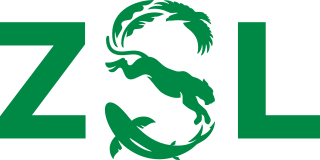
The Zoological Society of London (ZSL) is a charity devoted to the worldwide conservation of animals and their habitats. It was founded in 1826. Since 1828, it has maintained London Zoo, and since 1931 Whipsnade Zoo.

Whipsnade Zoo, formerly known as ZSL Whipsnade Zoo and Whipsnade Wild Animal Park, is a zoo and safari park located at Whipsnade, near Dunstable in Bedfordshire, England. It is one of two zoos that are owned by the Zoological Society of London (ZSL), a charity devoted to the worldwide conservation of animals and their habitats.
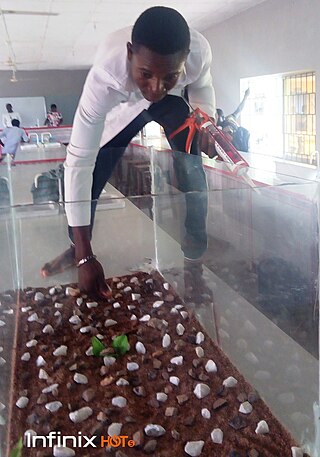
An aquarist is a person who manages aquariums, either professionally or as a hobby. They typically care for aquatic animals, including fish and marine invertebrates. Some may care for aquatic mammals. Aquarists often work at public aquariums. They may also work at nature reserves, zoos, and amusement parks. Some aquarists conduct field research outdoors. In business, aquarists may work at pet stores, as commercial fish breeders, or as manufacturers. Some aquarists are hobbyists, also known as "home aquarists," who may vary in skills and experience.

Mote Marine Laboratory is an independent, nonprofit, marine research organization based on City Island in Sarasota, Florida, with additional campuses in eastern Sarasota County, Boca Grande, Florida, and the Florida Keys. Founded in 1955 by Eugenie Clark in Placida, Florida, it was known as the Cape Haze Marine Laboratory until 1967. The laboratory aims to advance marine science and education, supporting conservation and sustainable use of marine resources. A public aquarium and associated education program interpret its research for the public.

The big-belly seahorse or pot-bellied seahorse is one of the largest seahorse species in the world, with a length of up to 35 cm (14 in), and is the largest in Australia. Seahorses are members of the family Syngnathidae, and are teleost fishes. They are found in southeast Australia and New Zealand, and are listed on Appendix II of CITES.
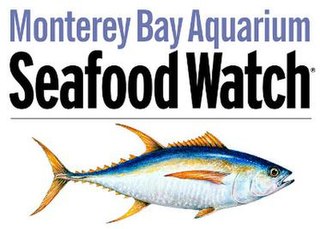
Seafood Watch is a sustainable seafood advisory list, and has influenced similar programs around the world. It is best known for developing science-based seafood recommendations that consumers, chefs, and business professionals use to inform their seafood purchasing decisions.
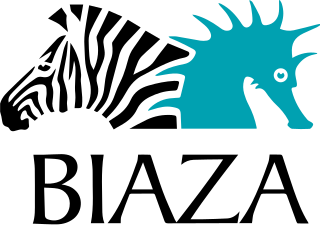
The British and Irish Association of Zoos and Aquariums (BIAZA) is a registered charity and the professional body representing over 100 zoos and aquariums in Britain and Ireland.

A public aquarium or public water zoo is the aquatic counterpart of a zoo, which houses living aquatic animal and plant specimens for public viewing. Most public aquariums feature tanks larger than those kept by home aquarists, as well as smaller tanks.

Barbour's seahorse is a species of fish of the family Syngnathidae.

21st Century Tiger raises funds for wild tiger conservation projects. It was formed in 1997 as a partnership between the Zoological Society of London (ZSL), Global Tiger Patrol (GTP) and Tusk Force so that the three groups could collaborate, rather than compete, in raising money for tigers in the UK. The two current members of the coalition are ZSL and Dreamworld Wildlife Foundation (DWF). Based in offices provided by ZSL in Regent's Park, London, and with administration funded by a sponsor, it is able to spend 100% of funds raised on tiger projects. 21st Century Tiger is one of the top seven contributors to tiger conservation worldwide and since its inception it has provided over £2 million to over 70 tiger projects in seven countries.
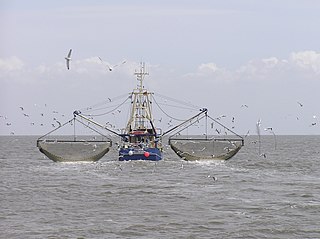
A wild fishery is a natural body of water with a sizeable free-ranging fish or other aquatic animal population that can be harvested for its commercial value. Wild fisheries can be marine (saltwater) or lacustrine/riverine (freshwater), and rely heavily on the carrying capacity of the local aquatic ecosystem.
Gordon McGregor Reid PPFLS was Director General and Chief Executive of the North of England Zoological Society, popularly known as Chester Zoo. He stepped down in 2010. The North of England Zoological Society is an independent charity for conservation, education and science. It is also one of the leading wildlife attractions in the UK, receiving well over one million paying guests each year.

Project Seahorse is a marine conservation organization committed to the conservation and sustainable use of coastal marine ecosystems in general, and seahorses in particular. It is based at the Institute for the Oceans and Fisheries in Canada, and Zoological Society of London in the UK.

Amanda Vincent is a Canadian marine biologist and conservationist, one of the world's leading experts on seahorses and their relatives. She currently holds the chair of the IUCN SSC Seahorse, Pipefish and Seadragon Specialist Group and is the marine representative on the IUCN's International Red List Committee as well as being the chair of its Marine Conservation Committee. She previously held the Canada Research Chair in Marine Conservation at the UBC Institute for the Oceans and Fisheries at the University of British Columbia (UBC), Canada from 2002 to 2012. Vincent co-founded and directs Project Seahorse, an interdisciplinary and international organization committed to conservation and sustainable use of the world's coastal marine ecosystems. In 2020 she became the first marine conservationist to win the world's leading prize for animal conservation, the Indianapolis Prize.
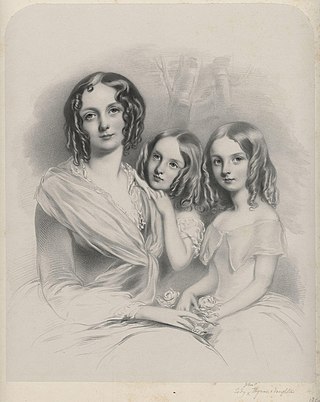
Anna Constantia Thynne, Lady John Thynne was a British marine zoologist. In 1846, she built the first stable and sustained marine aquarium and maintained corals and sponges in it for over three years.
Saltwater fish, also called marine fish or sea fish, are fish that live in seawater. Saltwater fish can swim and live alone or in a large group called a school.
Richard Charles Thompson is a marine biologist who researches marine litter. At the University of Plymouth he is director of the Marine Institute; professor of Marine Biology; and leads the International Marine Litter Research Unit. Thompson coined the term "microplastics" in 2004.
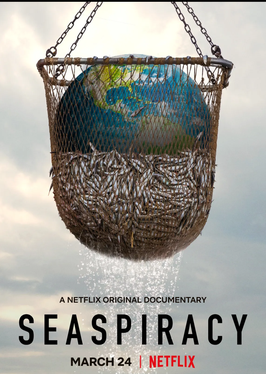
Seaspiracy is a 2021 documentary film about the environmental impact of fishing directed by and starring Ali Tabrizi, a British filmmaker. The film examines human impacts on marine life and advocates for ending fish consumption.

















